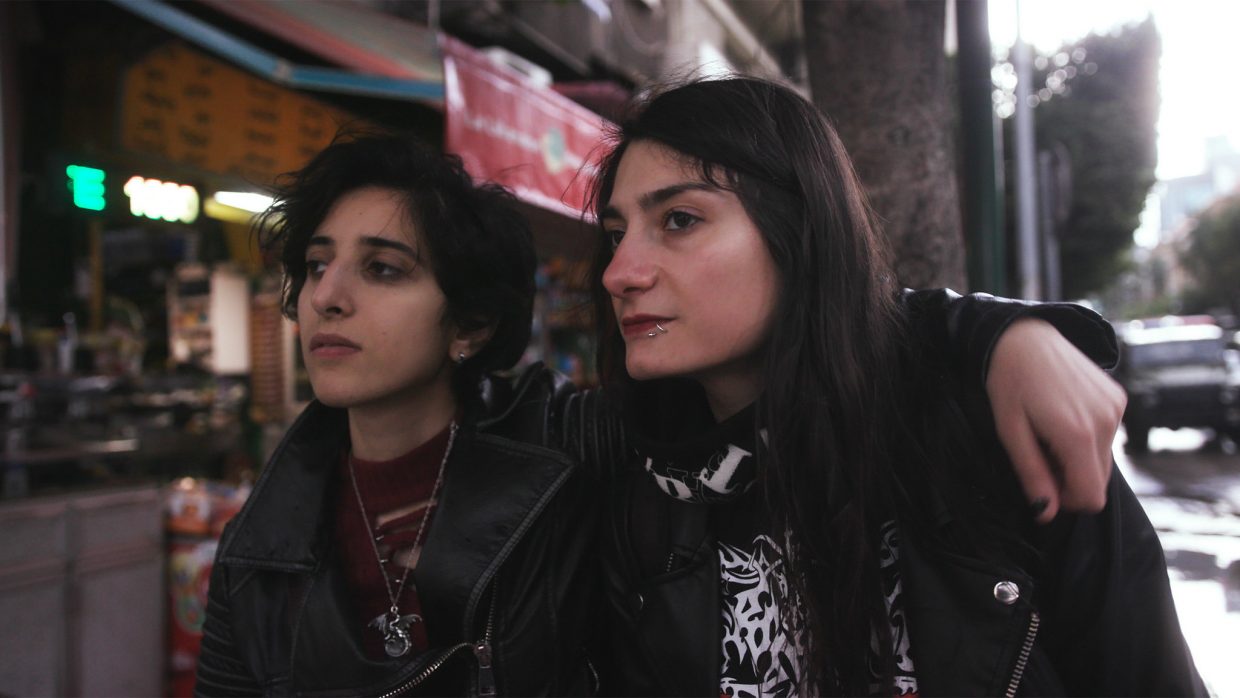 Back to selection
Back to selection
“A Labor of Love, Every Step of the Way”: Editor Grace Zarah on Sirens
 Shery Bechara and Lilas Mayassi in Sirens
Shery Bechara and Lilas Mayassi in Sirens Although Sirens captures a historic band—the all-woman Lebanese thrash metal band Slave to Sirens—at an equally historic moment in their nation’s history, director Rita Baghdadi and editor Grace Zarah quickly agreed that it was neither of these threads but instead the moments of friendship that were at the heart of their footage. Below, Zarah talks about looking for those moments and determining how to depict the August 2020 port explosion in Beirut.
Filmmaker: How and why did you wind up being the editor of your film? What were the factors and attributes that led to your being hired for this job?
Zarah: I first came to hear about Sirens from another editor who was helping Rita Baghdadi, the director, with an early sizzle and… I was filled with jealousy! I remember thinking, “That’s my edit!” A documentary about an all-girl metal band from Beirut, Lebanon! As a Lebanese-American, I couldn’t even believe a documentary with those descriptors could possibly exist. Almost two years later, Camilla Hall, producer of Sirens and director of my first feature edit Copwatch, reached out and asked if I was possibly interested. I was in the middle of a year-long hiatus from editing, but I knew I could not miss the opportunity to work on a story that resonated so personally with me. It is one of the best decisions I have ever made.
Filmmaker: In terms of advancing your film from its earliest assembly to your final cut, what were goals as an editor? What elements of the film did you want to enhance, or preserve, or tease out or totally reshape?
Zarah: From its earliest assembly, Rita and I were convinced that the most compelling story was the intimate story of friendship between the band members. This was hard to tease out because it is also the most subtle storyline. We were constantly sifting through the footage for little glances, quiet moments, and delicate signs of friendship at its best and worst.
Filmmaker: How did you achieve these goals? What types of editing techniques, or processes, or feedback screenings allowed this work to occur?
Zarah: We worked by process of elimination, as suggested by our supervising editor Lindsay Utz. We started with an eleven-hour assembly that was whittled down to two hours, and from there really shaped it into the final version. After it was cut to under two hours we were sharing the cut with other editors and filmmakers at least once a week.
Filmmaker: As an editor, how did you come up in the business, and what influences have affected your work?
Zarah: A series of happy accidents led me to editing, namely directors Camilla Hall and Shaun Kadlec believing in me as an editor. Other influences include Danial Lindsay and TJ Martin, the executive producers of Copwatch.
Filmmaker: What editing system did you use, and why?
Zarah: Adobe Premiere Pro.
Filmmaker: What was the most difficult scene to cut and why? And how did you do it?
Zarah: There are lots of difficult scenes in vérité documentary because of coverage or off camera dialogue, but the most emotionally challenging scene to cut was the port explosion. I kept putting it off and putting it off, until eventually Rita insisted I come up with something. I worked on this scene alone to start and it was very difficult sifting through footage online from bystanders. I eventually landed on the wide shot of the port because it showed just how immense the explosion was, leaving room to imagine the devastation without needing to push the audiences’ faces into the gore of it.
Filmmaker: Finally, now that the process is over, what new meanings has the film taken on for you? What did you discover in the footage that you might not have seen initially, and how does your final understanding of the film differ from the understanding that you began with?
Zarah: I got involved with the film early on in the pandemic and I saw everyone’s lives change both in front of the camera and behind it over the course of the last two years. I think working on Sirens was a lifeline escape for me and many others involved in the film. To be able to throw ourselves into a project that was so meaningful while so much of our lives were being upended outside was a blessing. I could have never predicted how deeply I’d fall in love with each band member and each team member behind the scenes. Sirens was a labor of love, every step of the way.
